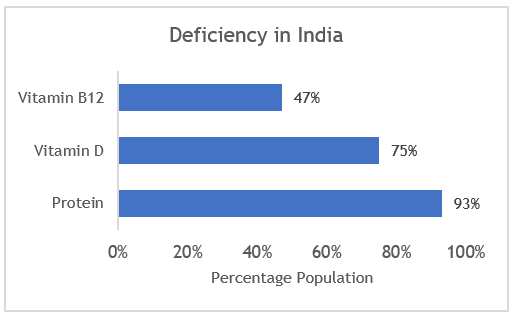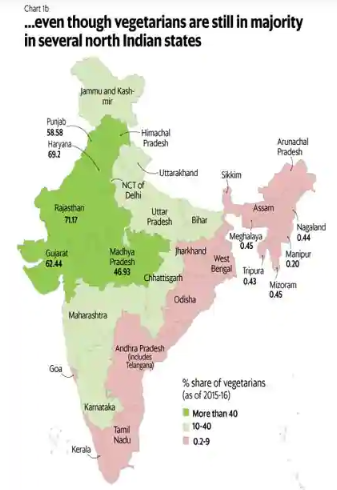EVO Foods is a plant-based eggs start-up founded by two entrepreneurs passionate about alternative food space. This start-up aims to revolutionise the food industry by evolving the consumers eating habits. It uses plant proteins derived from lentils to create a sustainable “evolved” replica of egg that comes without any antibiotics, animal cruelty or cholesterol. In addition, the eggs are fortified with vitamin D, a major deficiency in Indians, and also contains a branched chain of amino acid, which benefits muscle growth. The protein content is identical to that of a traditional egg, and so is the taste and texture.
India is a country where majority of meat eating population is open to consume plant-based meat alternatives compared to its counterparts in the west. Vegan business has a huge potential for growth in India. Global consumer adoption and interest in plant-based protein food alternatives has been on the rise due to an increasing preference for antibiotics and cruelty-free food products, thereby giving rise to the blitz of clean food innovators who are seeking to capture the market opportunity. If accepted by the consumers, it would be a game-changer for not only the Indian market but globally as well.
India is deemed to be the vegetarian capital of the world (31-33% people living in India are vegetarians) and the definition of vegetarian varies significantly for different sets of people which makes India an attractive market for start-ups in plant-based food like EVO Foods to disrupt.
Indian Consumers can be layered in 4 categories according to their eating habits:
- Vegans
- Pure vegetarians
- Vegetarians who do not hesitate consuming eggs in breads, cakes, etc.
Then, Non – vegetarians
The EVO Journey:
Who would have thought that the founders of a start-up trademark the name even before the idea? Yes, you read it right. That’s what Mr Kartik Dixit did. Being an enthusiast for the alternative protein space and also an entrepreneur in multiple start-ups, Mr Kartik had already trademarked the name “Evo” for his next start-up even before the idea. He believes that we are in the stage of EVOlution with the help of technology, evolving from animal-based food to plant-based and evolving to be a better human.
Mr Kartik had already learnt about the Indian start-up ecosystem with a few start-ups he started earlier. He worked on India’s first cell based meat company. He had already been working to bring cell-based protein in India for 1.5 years before starting up EVO Foods. And hence, when he was attending one of the food conferences, he happened to meet Ms Shraddha Bhansali. Ms Bhansali wanted to explore cell-based alternative protein at her restaurant, Candy and Green – a plant-based restaurant cultivating produce for its kitchen on the restaurant terrace, one of the early adopters of zero-carbon rooftop farming.
They realised that their missions were aligned and there is a huge gap in the plant-based alternative protein market. Ms Shraddha has numerous restaurants in her network, and Mr Kartik has the experience in alternative protein space. And as their passion was visible in the kind of work they were doing already, they decided to start a plant-based company, EVO Foods in August 2019. After analysing the market for around 6 months, they decided that plant-based egg would be perfect to start with. However, this journey wasn’t as easy as it sounds. Initially, they faced a lot of difficulties finding investors for their company. Indian investors were sceptical and not ready to invest in this space. However, in 2020, they found international investors, advisors and mentors to support them. These investors are veterans in the alternative protein space. Veterans include Ryan Bethencourt, founder of US-based clean protein dog food maker, Wild Earth (You might remember him from his appearance on Shark Tank Show ). Other investors include Big Idea Ventures, VegInvest, Sandhya Sriram.
Statistically Optimistic!
i. With around a billion eggs currently produced in India, the availability of such plant-based alternatives would have a big impact and will also be a solution for the dietary needs of the country’s 400-million-strong vegetarian population.
ii. The global protein alternatives market is estimated to grow at a CAGR of 7.4% between 2020 and 2025, with the Asia-Pacific region to be the fastest-growing as the consumers in this region embrace more proteins in their daily diets.
iii. When it comes to health, no other diet has such a positive impact as a plant-based diet. This fact has been reinforced by globally renowned documentaries – The Game Changers. This diet is also adopted by top athletes like Virat Kohli and Sunil Chetri.
Targeting the imperfect!
EVO Foods will start with eggs because they perceive egg to be a grey area in the Indian markets. There is a lot of confusion around eggs w.r.t its classification of being considered as a vegetarian or non-vegetarian food product.
i. Health-conscious people who are worried about the rise in diseases caused by food and lifestyle choices are increasingly moving towards plant-based diets. According to science, a plant-based diet can help to reverse most diseases such as heart disease, diabetes and cholesterol caused due to dietary choices.
ii. Vegans and vegetarians who want to consume eggs but their values and cultures do not allow them to form part of the target market.
iii. Health-focused consumers, including young mothers, pregnant women, patients, athletes, etc. are believed to be early adopters of this product.
Pricing may not be the catch!
Plant-based alternatives are priced higher because of higher production costs. According to their founders, they are going to keep the price 50-60% higher than a normal egg. An egg costs around INR 6. Considering this price range, plant-based egg (by EVO) will be priced around INR 9-10. Pricing might not be a major problem. Per unit economics, a bunch of health benefits, etc. are enough to overpower the additional price.
Positioning Matters!!
The main driving force could be the positioning of these eggs in the market. Liquid Eggs can be placed in two broader ways in the market:
i. As a healthy and nutritious product.
ii. As a closer substitute to the normal egg taking advantage of unit economics.
If it is advertised as a “healthy egg”, then it would be able to cater to niche segments only i.e. people on high-end incomes, leading to lower penetration in the market.
But if they would become successful in positioning plant-based eggs as a closer substitute to a normal egg, a huge market can be penetrated and served.
The Indian Hypothesis!
The India story for EVO foods can be massive, and yield good results apart from benefiting the health of the broader population. Not only the size of India’s population plays a factor here, but also the underlying health benefits that plant-based eggs bring. EVO’s decision to market and position the product is critical here as they have two broader ways to position their product.
When looking at the overall population deficiencies in India –
i. Protein deficiency is one of the most prominent deficiencies in India. A survey concludes that 9 out of 10 individuals suffer from protein deficiency in India:
- As many as 91% vegetarians and 85% non-vegetarians are protein deficient in India.
- 75% and 47% of the Indians are deficient in Vitamin D and Vitamin B12 respectively

EVO foods founders have suggested that they would like to target the large vegetarian population of India. Their projection is that vegans and vegetarians will be the early adopters of the plant-based eggs. The vegetarian population in itself can be very large to serve. Especially in North India, where the deficiency numbers are the highest.

However, relative comparable studies conducted for plant-based meat in India suggest that omnivores are more inclined to eat plant-based meat. Other categories include higher income groups in India, more educated and politically liberal consumers. And familiarity with the products is strongly predictive of purchase intent.
NPD research report suggests the same hypothesis. Almost 90% of the people eating plant-based meat are not vegetarians or vegans.
Conclusion:
Evo Foods is on a mission to change consumer’s perception by evolving their eating habits. They are the first to blaze the trail in the Indian markets.
The journey is going to be full of challenges. Due to Covid-19, they are faced with a big obstacle even before bringing their product in the market. They have to tweak their target market from B2B to B2C. But both the founders stand strong to accept any challenge and inculcate healthy eating habits in the diets of Indian consumers.
Follow Us @




